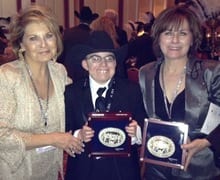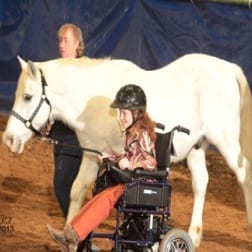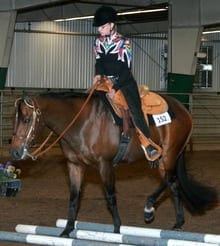by Cindy Chilton-Moore
Last year, Executive Director of Shows, Patti Carter-Pratt, was determined to expand the current American Quarter Horse Association (AQHA) Equestrians With Disabilities program. She wanted everyone to have the opportunity to compete with the American Quarter Horse.
One of the instrumental players in getting AQHA Equestrians With Disabilities (EWD) classes off the ground in 2003 was former AQHA judge Mary Hopkins of Vicksburg, Mississippi. About 22 years ago, Hopkins became interested in starting a EWD program due to her late daughter, Andrea wanting to start a program for handicapped riding. After her daughter’s death, Mary picked up the reins and started a program called Equi-Able, in Vicksburg. Hopkins appealed to AQHA Executive Vice President Don Treadway Jr. for years to develop something sanctioned by AQHA. Initially, the program featured three classes.
In February 2013, the AQHA EWD Task Force comprised of Cindy Chilton-Moore, Jen Donahue, Heather Hernandez, Mary Hopkins, Suzy Jeane, Lili Kellogg, Shaun Mcgee, and Marilyn Randall were challenged to think big. Collaboration spanned associations and disciplines throughout the equine industry. Carter-Pratt included point persons, Brad Ettelman, USA Reining; Dianne Eppers, National Snaffle Bit Association; Beth Himes and Jennifer Hoyt, National Reining Horse Association; Hope Hand, United State Para-Equestrian Association; Dr. David Denniston, HorseShowPatterns.com, and Tim Kimura, aka, “Man of Trail” to utilize their experience and talents.
 For the first time in history, on November 15, the Para-Equestrian discipline Para-Reining was demonstrated in the Performance Arena at the State Fair Park in Oklahoma City during the AQHA World Championship Quarter Horse Show. Debuting the discipline were exhibitors who have made their mark in the Para-Dressage world and one from the AQHA, which were judged by FEI 4* Reining judge Joe Carter from Canada.
For the first time in history, on November 15, the Para-Equestrian discipline Para-Reining was demonstrated in the Performance Arena at the State Fair Park in Oklahoma City during the AQHA World Championship Quarter Horse Show. Debuting the discipline were exhibitors who have made their mark in the Para-Dressage world and one from the AQHA, which were judged by FEI 4* Reining judge Joe Carter from Canada.
Members of the NRHA and USA Reining loaned the credentialed reining horses for the competitors. The Para-Reining demonstration was a chance for spectators, organizers, and current and potential athletes to experience Para-Reining on an international platform. This event was the launch pad and pipeline with a goal of that one day Para-Reining athletes could one day earn a spot to represent their nation at international Para-Reining championships with an eye on the Para Olympics.
On Monday morning, January 13, 2014, equestrians with disabilities will compete at the Fort Worth Stock Show and Rodeo which has once again graciously donated John Justin Arena, as well as many other amenities for the largest EWD competition known as the Chisholm Challenge. The Chisholm Challenge exists and continues to grow due to the remarkable individuals who donate their time and talents.
“This affords the competitors the opportunity to have a venue to showcase their abilities as equestrian athletes in classes,” Chilton-Moore told GoHorseShow.
Classes such as Showmanship, Walk and Trot Hunt Seat Equitation on the Flat, Walk and Jog Western Horsemanship, Walk, Trot/Jog Trail Horse Class, a canter/lope Hunt, Western and Trail Class will be avaiiable for the public to watch.
On January 14 and 15, 2014, North Texas Area Therapeutic Riding Centers will participate in their show. The equestrians will compete in events such as English Equitation, Western Equitation, Western Riding, Showmanship, Barrels, Pole Bending, Drill Team, Driving and Trail.
 “All participating centers are PATH (Professional Association of Therapeutic Horsemanship, International) member centers,” Chilton-Moore states. “This ensures that all competitors have certified instructors, trained horses and recognize and respect all safety requirements. Each center is expected to adhere to the Chisholm Challenge and PATH rules and regulations during this competition.”
“All participating centers are PATH (Professional Association of Therapeutic Horsemanship, International) member centers,” Chilton-Moore states. “This ensures that all competitors have certified instructors, trained horses and recognize and respect all safety requirements. Each center is expected to adhere to the Chisholm Challenge and PATH rules and regulations during this competition.”
Due to the efforts of the AQHA EWD Task Force, Equestrians With Disabilities programs are available in AQHA as well as NSBA, NRHA PHBA and US Para-Equestrians.
“The benefits of therapeutic horseback riding are well established and enable riders with physical and mental challenges to strengthen their bodies and empower their spirits,” says Chilton-Moore, who is passionate about this program. “A horse show that promotes and encourages further development provides these competitors the opportunity to show off all their hard work and talents.”
**Special thanks to Cindy Chilton-Moore for taking the time to write the article and explain the amazing work the task force has done in expanding this program








